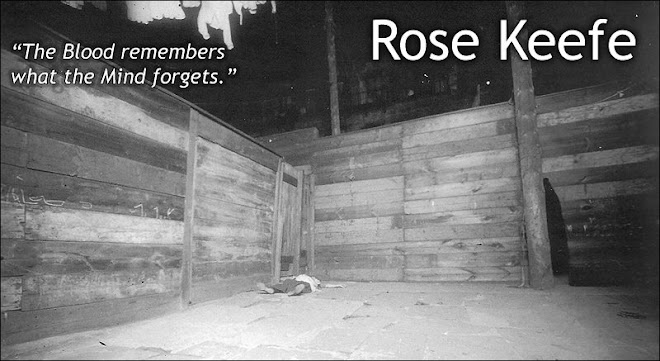 In August 1849, Frederick Manning and his Swiss wife, Maria, lured a middle-aged moneylender named Patrick O'Connor to their home in the Bermondsey section of London. O'Connor and Mrs. Manning had been lovers prior to her marriage, and probably for awhile afterward too. They shot and clubbed him to death, covered his body with quicklime, and then buried it under their kitchen floor. Maria hurried to O'Connor's rented room, where she stole money and railway share certificates. Then she and Frederick fled in opposite directions: she went to Edinburgh while he sailed to the Channel Islands. When a concerned friend reported O'Connor's disappearance, the police went to the Manning home and discovered the makeshift grave. After a nationwide manhunt, the murderous couple was arrested, tried, and sentenced to death. They were hung at Horsemonger Lane Gaol in November 1849, in front of a raucous crowd.
In August 1849, Frederick Manning and his Swiss wife, Maria, lured a middle-aged moneylender named Patrick O'Connor to their home in the Bermondsey section of London. O'Connor and Mrs. Manning had been lovers prior to her marriage, and probably for awhile afterward too. They shot and clubbed him to death, covered his body with quicklime, and then buried it under their kitchen floor. Maria hurried to O'Connor's rented room, where she stole money and railway share certificates. Then she and Frederick fled in opposite directions: she went to Edinburgh while he sailed to the Channel Islands. When a concerned friend reported O'Connor's disappearance, the police went to the Manning home and discovered the makeshift grave. After a nationwide manhunt, the murderous couple was arrested, tried, and sentenced to death. They were hung at Horsemonger Lane Gaol in November 1849, in front of a raucous crowd.Using the title alone as a point of reference, London 1 849: a Victorian Murder Story appears to be about the Manning case. But it isn't. Michael Alpert has written a social history of London in the year 1849, when the O'Connor murder shocked the city. The first chapter is dedicated to the crime and the apprehension of Frederick and Maria Manning, and the concluding one uses their trial and execution to illustrate the workings of the British justice system. But the rest of the book is an admittedly fascinating look at the daily lives of mid-nineteenth century Londoners: what they ate, where they went for entertainment, how the class system worked, and the waning role of religion in their lives.
849: a Victorian Murder Story appears to be about the Manning case. But it isn't. Michael Alpert has written a social history of London in the year 1849, when the O'Connor murder shocked the city. The first chapter is dedicated to the crime and the apprehension of Frederick and Maria Manning, and the concluding one uses their trial and execution to illustrate the workings of the British justice system. But the rest of the book is an admittedly fascinating look at the daily lives of mid-nineteenth century Londoners: what they ate, where they went for entertainment, how the class system worked, and the waning role of religion in their lives.
Whenever possible, Alpert frames his topic to suggest what the Mannings might h ave done in a given circumstance. For example, in the chapter about recreation, he proposes that Maria would not have been interested in the Frith paintings at the National Gallery, as she had been a lady's maid in wealthy homes prior to her marriage and probably seen her fill of such masterpieces. When discussing the modes of public transportation available in 1849, Alpert presents a reasonably accurate re-enactment of Frederick Manning's flight from London to the Channel island of Jersey, where he was finally apprehended.
ave done in a given circumstance. For example, in the chapter about recreation, he proposes that Maria would not have been interested in the Frith paintings at the National Gallery, as she had been a lady's maid in wealthy homes prior to her marriage and probably seen her fill of such masterpieces. When discussing the modes of public transportation available in 1849, Alpert presents a reasonably accurate re-enactment of Frederick Manning's flight from London to the Channel island of Jersey, where he was finally apprehended.
I love social history and true crime, so have absolutely no complaints about Michael Alpert's marriage of the two genres. But he runs the risk of disappointing true crime fans who pick up his book expecting to read a concise account of the 'Bermondsey horror'. These people will be better off tracking down a copy of Albert Borowitz's The Woman Who Murdered Black Satin: The Bermondsey Horror.
